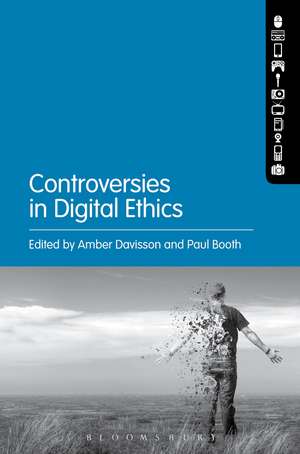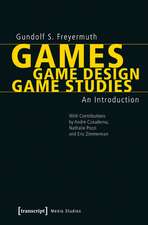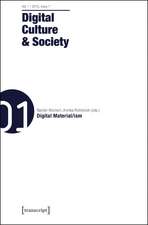Controversies in Digital Ethics
Editat de Amber Davisson, Dr. Paul Boothen Limba Engleză Paperback – 23 aug 2017
| Toate formatele și edițiile | Preț | Express |
|---|---|---|
| Paperback (1) | 260.73 lei 43-57 zile | |
| Bloomsbury Publishing – 23 aug 2017 | 260.73 lei 43-57 zile | |
| Hardback (1) | 835.25 lei 43-57 zile | |
| Bloomsbury Publishing – 6 apr 2016 | 835.25 lei 43-57 zile |
Preț: 260.73 lei
Preț vechi: 297.08 lei
-12% Nou
Puncte Express: 391
Preț estimativ în valută:
49.89€ • 52.22$ • 41.52£
49.89€ • 52.22$ • 41.52£
Carte tipărită la comandă
Livrare economică 31 martie-14 aprilie
Preluare comenzi: 021 569.72.76
Specificații
ISBN-13: 9781501320200
ISBN-10: 1501320203
Pagini: 320
Dimensiuni: 152 x 229 x 24 mm
Greutate: 0.52 kg
Ediția:NIPPOD
Editura: Bloomsbury Publishing
Colecția Bloomsbury Academic
Locul publicării:New York, United States
ISBN-10: 1501320203
Pagini: 320
Dimensiuni: 152 x 229 x 24 mm
Greutate: 0.52 kg
Ediția:NIPPOD
Editura: Bloomsbury Publishing
Colecția Bloomsbury Academic
Locul publicării:New York, United States
Caracteristici
Editors' introduction offers an overview of major ethical, legal, and economic issues relating to digital ethics
Notă biografică
Amber Davisson is an Assistant Professor of Communication at Keene State College, USA. She is the author of Lady Gaga and the Remaking of Celebrity Culture (2013). Her research on political communication in digital spaces has appeared in Rhetoric & Public Affairs, Journal of Media & Digital Literacy, Journal of Visual Literacy, and the American Communication Journal.Paul Booth is a Professor of Communication at DePaul University, USA. He is the author of Digital Fandom: New Media Studies (2010), Time on TV: Temporal Displacement and Mashup Television (2012), Playing Fans: Negotiating Fandom and Media in the Digital Age (2015) and Game Play: Paratextuality in Contemporary Board Games (Bloomsbury, 2015). He is the editor of Fan Phenomena: Doctor Who (2013).
Cuprins
Introduction, Amber Davisson & Paul Booth (DePaul University, USA)SECTION 1: SEEKING PRIVACY IN THE AGE OF DIGITAL SURVEILLANCEChapter 1 - The Changing Efficacy of Notice and Consent in Protecting Privacy (J.J. Sylvia, North Carolina State University, USA)Chapter 2 - "The Classroom Is NOT a Sacred Space:" Revisiting Citizen Journalism and Surveillance in the Digital Classroom (Mary Grace Antony, Schreiner University, USA, and Ryan J. Thomas, University of Missouri School of Journalism, USA)Chapter 3 - Julian Assange's Confidentiality Agreement: Freedom and Irony in the Ethics of Information (Ryan Gillespie, Annenberg School for Communication & Journalism at the University of Southern California, USA)Chapter 4 - Passing Around Women's Bodies Online: Sex, Power, and Privacy on Reddit (Amber Davisson, DePaul University, USA)SECTION 2: PARTICIPATORY CULTUREChapter 5 - "Making and Hacking": The Politics of Distributed Ethics (Shenja van der Graaf, iMinds-SMIT, Vrije Universiteit Brussel, Belgium)Chapter 6 - Just War Craft (Tom Bivins & Matthew Pittman, University of Oregon, USA)Chapter 7 - Between Ethics, Fandom and Social Media: New Trajectories that Challenge Media Producer/Fan Relations (Lucy Bennett & Bertha Chin, Cardiff University, UK, and Bethan Jones, Aberystwyth University, UK)Chapter 8 - Scam Advertising in the Digital Age: Creative Reputation Building or Industry Irresponsibility? (Michelle Amazeen & Susan O'Sullivan-Gavin, Rider University, USA)Chapter 9 - Steve Jobs is Dead: iReport & The Ethos of Citizen Journalism (Shane Tilton, Ohio Northern University, USA)SECTION 3: PROFESSIONAL COMMUNICATIONChapter 10 - Perfectly "Compliant": The Devaluation of Ethics and Empathy in Marketing/Communications Industry Discourse (Sam Ford, Western Kentucky University, USA)Chapter 11 - The Emerging Ethics of Online Political Strategists (Luis Hestres, University of Texas at San Antonio, USA)Chapter 12 - Cash Out: Philanthropy, Sustainability and Ethics in Nonprofit News (Joe Cutbirth, Manhattan College Center for Ethics, USA)Chapter 13 - Ethical Issues in News Media Coverage of Transgender People (Susan Wildermuth, University of Wisconsin-Whitewater, USA)Chapter 14 - The Harm of Video Games: The Ethics Behind Regulating Minors' Access to Violent Video Games in Light of the Supreme Court Ruling (Ryan Rogers, Marist College, USA)SECTION 4: IDENTITY IN A DIGITAL WORLDChapter 15 - Paradigm Shift: Media Ethics in the Age of Intelligent Machines (David Gunkel, Northern Illinois University, USA)Chapter 16 - Mad Men and Race: The Possibility of Empathetic Identification through Fan Discourse (Sarah Nilsen, University of Vermont, USA)Chapter 17 - Not Your Mother's Video Game: The Role of Motherhood in Video Game Advertising (Shira Chess, University of Georgia, USA)Chapter 18 - "Be a Bully to Beat a Bully": Twitter Ethics, Online Identity, and the Culture of Quick Revenge (Scott R. Stroud, University of Texas at Austin, USA)Chapter 19 - "Faux-Feminist Tea Party": The Ethics of Online Feminist Spaces as Read through Feminist Blog Jezebel (Molly Bandonis & Paul Booth, DePaul University, USA)Conclusion, Amber Davisson & Paul Booth (DePaul University, USA)Afterword: Dr Charles Ess (University of Oslo, Norway)BibliographyIndex
Recenzii
Controversies in Digital Ethics addresses the complex issues raised by the intrusion of digital technologies in our private lives and public spaces, ranging from interpersonal relationships to professional interactions to mass entertainment. As technology alters media, we must continue to interrogate our ethical frameworks for evaluating its impact on our lives, adjusting the traditional ethical models to meet new challenges from creep shots to digital hactivism to game design and social robots. Traditional ethical models for understanding communication have lagged behind the rapid evolution of media formats that affect a broad variety of fields from journalism, advertising, and public relations to politics, crowd-sourcing, and entertainment. This volume raises complex questions that underscore moral decisions, aiding producers and consumers of digital technologies to evaluate mediated messages through a series of case studies. It also recognizes the shifting power dynamic as consumers become producers of media in a world that is being rapidly transformed by participatory knowledge. As we find ourselves in situations that we could not have anticipated even a few years ago, we simultaneously confront controversies that are generated with the increased capacity to create, process, and distribute media. These essays illuminate the intersections where innovations challenge behaviors, asking the reader to reflect on the struggle to arrive at new guidelines for behavior from these quandaries.
Networked life often reminds us that communication situations were never as clear cut as we thought, and Controversies in Digital Ethics provides us with a range of tools for navigating the ethical predicaments that emerge in digital spaces. Davisson and Booth's collection expertly demonstrates how to ask the right questions as we become immersed and enmeshed in the various controversies of the digital world.
Controversies in Digital Ethics offers a comprehensive look at the ethical complexities of the digital lives we live. Focusing on a vast selection of topics, everything from fandom to cyberbullying, this edited volume offers an important set of case studies that encourage us to think critically about how these ethical moments challenge our sense of self and collective communities.
Networked life often reminds us that communication situations were never as clear cut as we thought, and Controversies in Digital Ethics provides us with a range of tools for navigating the ethical predicaments that emerge in digital spaces. Davisson and Booth's collection expertly demonstrates how to ask the right questions as we become immersed and enmeshed in the various controversies of the digital world.
Controversies in Digital Ethics offers a comprehensive look at the ethical complexities of the digital lives we live. Focusing on a vast selection of topics, everything from fandom to cyberbullying, this edited volume offers an important set of case studies that encourage us to think critically about how these ethical moments challenge our sense of self and collective communities.











